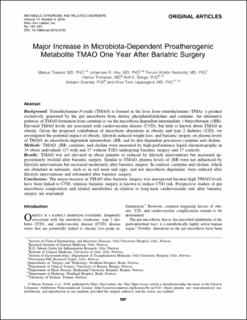| dc.contributor.author | Trøseid, Marius | |
| dc.contributor.author | Hov, Johannes Espolin Roksund | |
| dc.contributor.author | Nestvold, Torunn Kristin | |
| dc.contributor.author | Thoresen, Hanne | |
| dc.contributor.author | Berge, Rolf Kristian | |
| dc.contributor.author | Svardal, Asbjørn M. | |
| dc.contributor.author | Lappegård, Knut Tore | |
| dc.date.accessioned | 2022-04-27T13:14:50Z | |
| dc.date.available | 2022-04-27T13:14:50Z | |
| dc.date.created | 2016-07-05T07:33:57Z | |
| dc.date.issued | 2016 | |
| dc.identifier.issn | 1540-4196 | |
| dc.identifier.uri | https://hdl.handle.net/11250/2993064 | |
| dc.description.abstract | Background: Trimethylamine-N-oxide (TMAO) is formed in the liver from trimethylamine (TMA), a product exclusively generated by the gut microbiota from dietary phosphatidylcholine and carnitine. An alternative pathway of TMAO formation from carnitine is via the microbiota-dependent intermediate γ-butyrobetaine (γBB). Elevated TMAO levels are associated with cardiovascular disease (CVD), but little is known about TMAO in obesity. Given the proposed contribution of microbiota alterations in obesity and type 2 diabetes (T2D), we investigated the potential impact of obesity, lifestyle-induced weight loss, and bariatric surgery on plasma levels of TMAO, its microbiota-dependent intermediate γBB, and its diet-dependent precursors carnitine and choline.
Methods: TMAO, γBB, carnitine, and choline were measured by high-performance liquid chromatography in 34 obese individuals (17 with and 17 without T2D) undergoing bariatric surgery and 17 controls.
Results: TMAO was not elevated in obese patients or reduced by lifestyle interventions but increased approximately twofold after bariatric surgery. Similar to TMAO, plasma levels of γBB were not influenced by lifestyle interventions but increased moderately after bariatric surgery. In contrast, carnitine and choline, which are abundant in nutrients, such as in red meat and eggs, and not microbiota dependent, were reduced after lifestyle interventions and rebounded after bariatric surgery.
Conclusions: The major increase in TMAO after bariatric surgery was unexpected because high TMAO levels have been linked to CVD, whereas bariatric surgery is known to reduce CVD risk. Prospective studies of gut microbiota composition and related metabolites in relation to long-term cardiovascular risk after bariatric surgery are warranted. | en_US |
| dc.language.iso | eng | en_US |
| dc.publisher | Mary Ann Liebert, Inc. | en_US |
| dc.rights | Navngivelse-Ikkekommersiell 4.0 Internasjonal | * |
| dc.rights.uri | http://creativecommons.org/licenses/by-nc/4.0/deed.no | * |
| dc.title | Major increase in microbiota-dependent proatherogenic metabolite TMAO one year after bariatric surgery | en_US |
| dc.type | Journal article | en_US |
| dc.type | Peer reviewed | en_US |
| dc.description.version | publishedVersion | en_US |
| dc.rights.holder | Copyright 2016 The Author(s) | en_US |
| cristin.ispublished | true | |
| cristin.fulltext | original | |
| cristin.qualitycode | 1 | |
| dc.identifier.doi | 10.1089/met.2015.0120 | |
| dc.identifier.cristin | 1366164 | |
| dc.source.journal | Metabolic Syndrome and Related Disorders | en_US |
| dc.source.pagenumber | 197-201 | en_US |
| dc.relation.project | Norges forskningsråd: 240787 | en_US |
| dc.identifier.citation | Metabolic Syndrome and Related Disorders. 2016, 14 (4), 197-201. | en_US |
| dc.source.volume | 14 | en_US |
| dc.source.issue | 4 | en_US |

